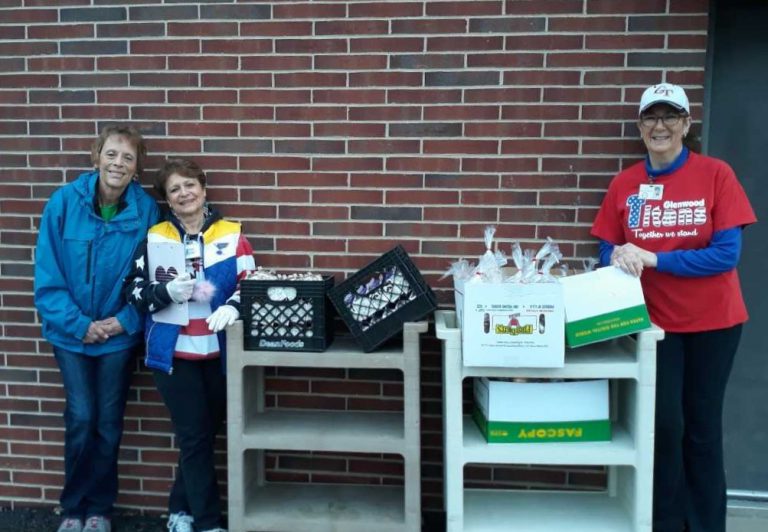Dawnal Mahan is an essential employee. She manages the cafeteria inside Chatham Elementary School, a kindergarten through fourth grade school in the small town located south of Springfield.
While most teachers aren’t in the building, Mahan is still going to work each school day to prepare pre-packaged meals for students — including breakfast and lunch.
At schools across the state, essential workers show up each day to feed students, even while school buildings remain closed in an effort to contain the coronavirus. In many cases administrators and teachers are the ones delivering meals to students.
Districts are not required to distribute food to students when schools are closed, however a spokesperson for the Illinois State Board of Education said they are highly encouraged to do so, and will be reimbursed for those meals.
This week, Mahan and her two co-workers distributed meals to families through the backdoor of the elementary school building. Families pull up to the back of the building, and she and her colleagues hand them bags of food through their driver-side windows. Mahan and her coworkers wear gloves and are careful to keep a safe distance.
Mahan said she’s worked for the Ball-Chatham School District for nearly three decades. Her mission during this public health crisis is to ensure every student who needs a meal gets one — even when they’re not in school.
“Because the kids need to be fed, they have to be fed, and so that’s why we we’re there to provide this,” Mahan said.
Some parents are embarrassed to pick up the meals, but Mahan doesn’t think they should be. In fact, she asks if they need more than a one-day supply, since not every family can do a pick up everyday.
“I say, ‘if you need more, please tell us.’ We told a lady if you’re not going to be able to come for two days in a row, then we’ll give you that to go ahead and provide for your family. And this person was extremely thrilled,” she said.
While teachers scramble to reinvent classes for remote learning, school officials across the state are trying to gauge what else their students and families need right now.
Food pickup at @Maine_East this morning with Kim, Andre and Dr. Pressler. We are all getting a little better at it each day at @Maine_207 #207Now #ilschoolsstepup pic.twitter.com/BcBWZtAQKJ
— Ken Wallace (@KenWallace207) March 18, 2020
In Chicago’s northwest suburbs, Ben Collins, principal of Maine South High School, said it’s an evolving situation. This week, families signed up ahead of time and then picked meals up from the district. He said it’s very likely they’ll begin delivering meals to students soon.
“If this continues long-term, this is only going to get worse for people who have food needs,” Collins said.
The uncertainty surrounding school closures in light of the coronavirus has weighed heavily on the minds of school staff across Illinois. It’s compelled some to invent creative ways to get food to students.
Jonathan Green is the superintendent of Meridian Community Unit School District 101, which covers nearly 100 square miles in rural southern Illinois. Families in Green’s district are poor; in fact, he said every one of the district’s roughly 450 students qualifies for free meals from school.
“We have to feed all of our kids no matter what. And I mean, I know all the other districts are supposed to feed their kids if they can. But we have to,” Green said.
Green and other school staff members, including teachers, are delivering meals via school bus to neighborhood bus stops in the district each weekday.
“We’ve been getting phone calls and messages… from people, just making sure that we know about this kid or this family, that they want to make sure they’re getting food because they know that they’re struggling,” Green said.
While super quiet now! We do have some energy in the building getting ready to send food! Thank you to our cafeteria, maintenance, volunteers and bus staff! #BobcatsRising pic.twitter.com/rxLw0qGm9p
— Meridian Unit Schools #101 (@101Meridian) March 18, 2020
Green is worried about those families, too. He said the area his district serves has few options to buy food, and just a single gas station. But Green said he’s heartened by the community’s willingness to help.
“We’re supposed to socially distance ourselves. That just means physical contact. It doesn’t mean we can’t help each other out and to make sure that we’re taking care of the people who are around us,” he said.
Green said he plans to ride the school buses everyday to deliver food to his students as long as schools remain closed. He said at least that way, he’ll get to see them.

